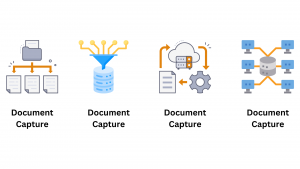 Managing vast amounts of data efficiently is crucial for businesses to stay competitive in today’s digital age. Traditional document processing methods, often characterized by manual data entry and sorting, are not only time-consuming but also prone to errors. This is where Intelligent Document Processing (IDP) comes into play, offering a cutting-edge solution that leverages artificial intelligence (AI) and machine learning (ML) to automate the extraction, classification, and handling of data from various document types.
Managing vast amounts of data efficiently is crucial for businesses to stay competitive in today’s digital age. Traditional document processing methods, often characterized by manual data entry and sorting, are not only time-consuming but also prone to errors. This is where Intelligent Document Processing (IDP) comes into play, offering a cutting-edge solution that leverages artificial intelligence (AI) and machine learning (ML) to automate the extraction, classification, and handling of data from various document types.
What is Intelligent Document Processing (IDP)?
Intelligent Document Processing (IDP) is a technology that automates the complex task of processing different kinds of documents. It can handle both structured data (like forms and spreadsheets) and unstructured data (like emails and scanned documents) with remarkable accuracy and efficiency. Unlike traditional document processing methods that require extensive manual effort, IDP can quickly process large volumes of documents, reducing the risk of human error and significantly improving operational efficiency.
How Does IDP Work?
IDP involves several key components that work together to transform how businesses handle documents:
- Document Capture: The journey of Intelligent Document Processing (IDP) begins with gathering documents from diverse sources, such as paper, PDFs, images, or emails. Technologies like OCR are used to extract text from images and scanned files. Additionally, NLP can be employed to understand the context and semantics of the text, transforming it into machine-readable formats. These technologies can be used independently or in combination, depending on specific requirements.
- Data Extraction: After classification, the next step is to extract relevant data points from the documents. This process is facilitated by various NLP and ML techniques, which enable the system to understand the document’s context and identify key information. The specific techniques used can vary depending on the IDP system’s design and the types of documents being processed.

- Data Validation: Extracted data needs to be verified for accuracy and completeness. This step often involves rule-based checks and human-in-the-loop validation, where human review and intervention are included when the automated system encounters ambiguous or uncertain data. For example, if a certain data point doesn’t match the expected format or value, it can be flagged for manual review.
- Data Enrichment: To add more value, IDP systems can enrich the extracted data by adding context or additional information from external sources. This might involve integrating the data with other systems or databases to create a more comprehensive dataset. Data enrichment is an advanced feature available in some IDP systems, depending on their integration capabilities.
Benefits of Implementing IDP
The implementation of IDP offers numerous advantages to organizations:
- Increased Efficiency: By automating document-intensive processes, IDP significantly reduces processing time and manual effort. This allows employees to focus on more strategic tasks rather than getting bogged down by routine data entry.
- Improved Accuracy: Human errors are a common issue in manual document processing. IDP minimizes these errors by ensuring higher data accuracy and consistency through automated processing.
- Cost Reduction: Automation paves the way for cost savings by cutting down on manual labor and minimizing errors that might otherwise lead to financial setbacks.
- Enhanced Customer Experience: Faster processing times and reduced errors contribute to improved customer satisfaction. For instance, quick and accurate processing of customer inquiries or claims can lead to a better customer experience.
- Compliance Adherence: Accurate and complete data capture helps organizations meet regulatory requirements, reducing the risk of non-compliance penalties.
Applications of IDP Across Industries
IDP has a wide range of applications across various industries, making it a versatile solution for many business needs:
Finance: IDP can streamline processes such as invoice processing, loan applications, insurance claims, and financial statements. By automating these tasks, financial institutions can improve accuracy and speed, leading to better service for their clients.
Healthcare: Legal professionals deal with vast amounts of paperwork, including contracts, legal documents, and discovery data. IDP can streamline document processing in the legal sector, making it easier to manage and retrieve important documents.
Human Resources: IDP can streamline processes such as invoice processing, loan applications, insurance claims, and financial statements. By automating these tasks, financial institutions can improve accuracy and speed, leading to better service for their clients.
Legal Advisory: Legal professionals deal with vast amounts of paperwork, including contracts, legal documents, and discovery data. IDP can streamline document processing in the legal sector, making it easier to manage and retrieve important documents.
Customer Service: IDP can enhance customer service operations by automating the handling of customer inquiries, support tickets, and feedback. This results in faster response times and heightened customer satisfaction.
Our Real-World Impact: How Experion Utilized IDP in an AI-Driven Claims Management Solution
Experion leveraged Intelligent Document Processing (IDP) to revolutionize a client’s claims management system. Here’s how IDP was utilized:
Document Capture and Digitization:
- Unstructured Data Processing: IDP enabled the system to handle unstructured data gathered in the field by converting various document types into machine-readable formats using advanced technologies like Optical Character Recognition (OCR) and Natural Language Processing (NLP). OCR extracts text from images and scanned documents, while NLP is used to understand the context and semantics of the text. Both technologies can be used independently or together, depending on specific requirements.
Automated Data Extraction:
- Damage Detection: The AI-driven damage detection feature utilized IDP to automatically extract relevant data from inspection documents and images. This process involves various NLP and Machine Learning (ML) techniques to understand the document’s context and identify key information. For instance, in an invoice, IDP can automatically extract details like invoice number, date, amount, and vendor name. The specific techniques used can vary depending on the IDP system’s design and the types of documents being processed, assessing damage and predicting necessary actions along with estimated costs.
Data Classification and Validation:
- Categorization: IDP categorized the incoming documents and data based on their content and context, ensuring that each claim was processed accurately.
- Fraud Detection: By validating the extracted data against actual damage and vendor quotes, IDP helped in preventing fraud and ensuring accuracy. This step often involves rule-based checks and human-in-the-loop validation, where human review and intervention are included when the automated system encounters ambiguous or uncertain data. For example, if a data point doesn’t match the expected format or value, it can be flagged for manual review.
Streamlined Claims Management:
- Digital Claims Processing: IDP digitalized the entire claims management workflow, eliminating manual data entry, reducing errors, and speeding up the process.
- Integrated Payments: The system included an integrated payment processing module, streamlining payments and further reducing manual errors.
By incorporating IDP, Experion transformed the client’s claims management process, making it more efficient, accurate, and scalable, ultimately enhancing customer satisfaction and operational efficiency.
Partner with Us!
At Experion, we harness the power of Intelligent Document Processing (IDP) to transform your business operations. Our cutting-edge IDP solutions automate the extraction, classification, and handling of data from various documents, helping you enhance efficiency, reduce costs, and boost customer satisfaction. As technology evolves, our IDP capabilities continue to expand, making Experion your go-to partner for staying competitive in the digital age. Ready to unlock the full potential of your data? Connect with us today to see how our IDP solutions can drive your business forward.

